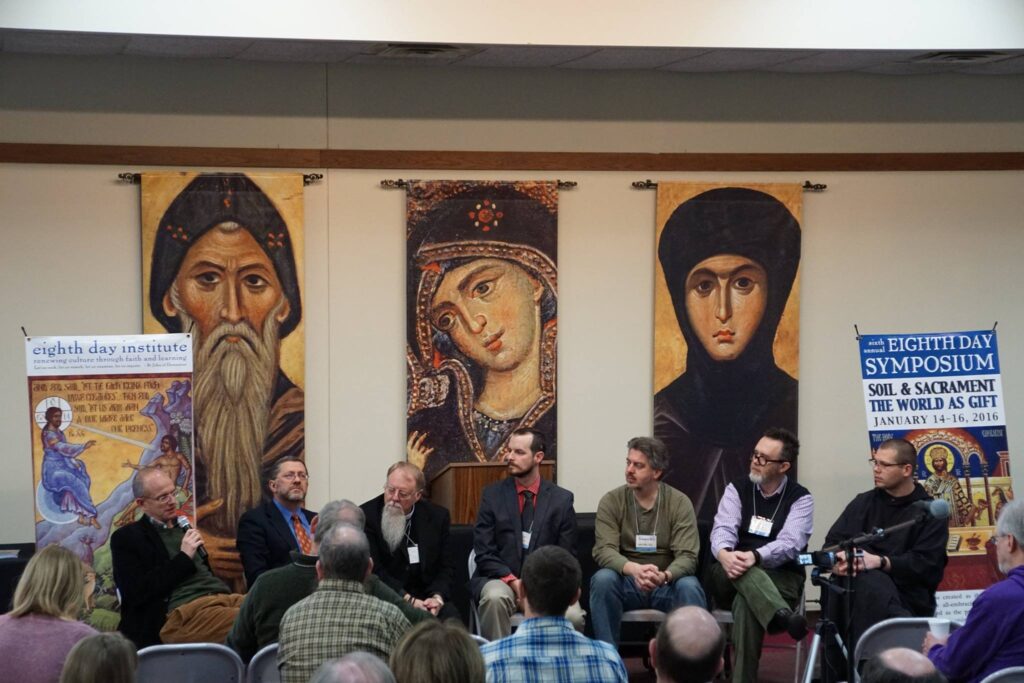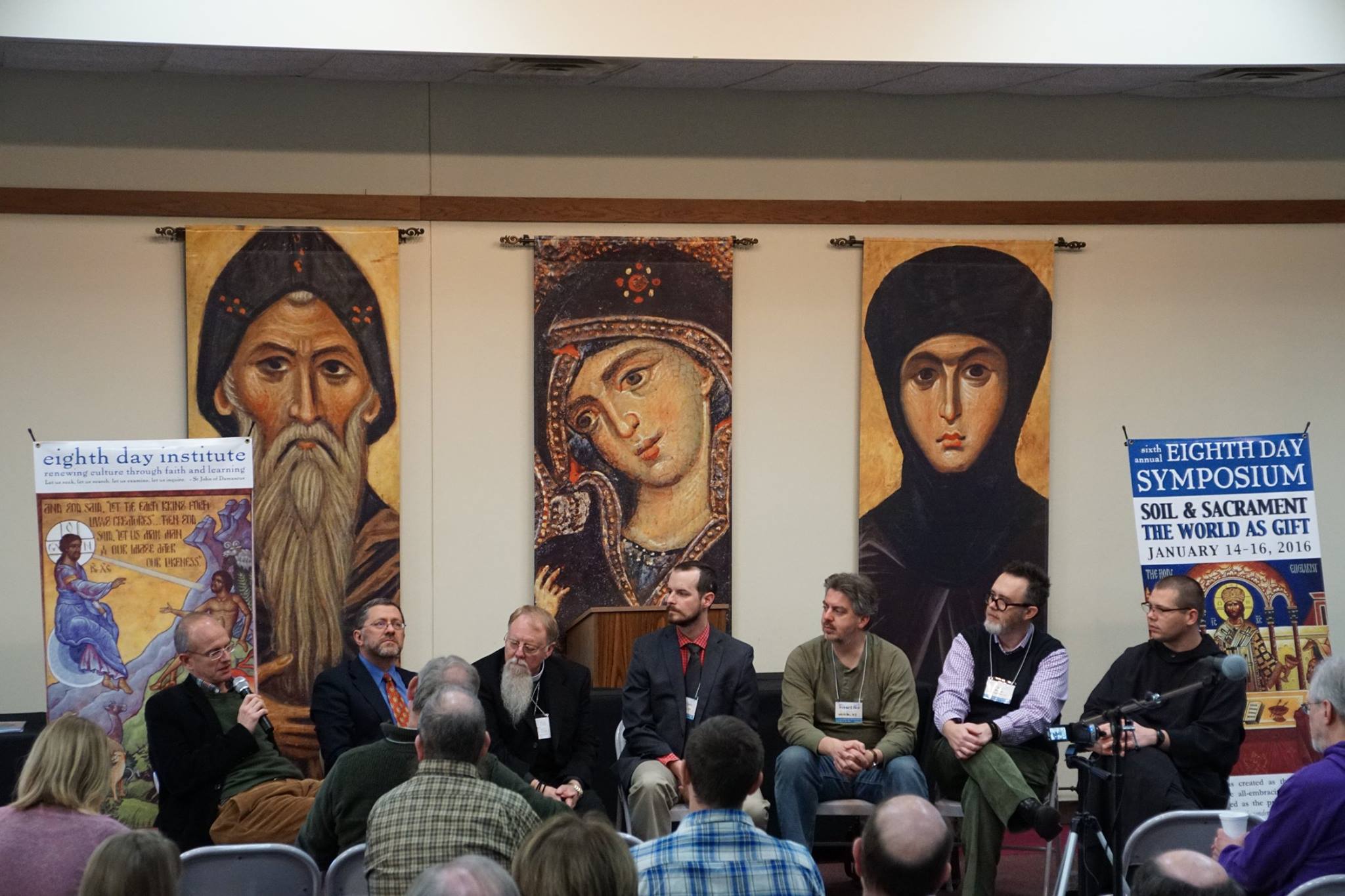
Awhile back, a student approached me about attending an upcoming conference with him. He explained it as a conference which would engage questions of culture and theology, especially the theology of the early church, and that it would include Christians from several different confessions—Roman Catholics, Orthodox, church-planting evangelicals, and maybe even a few Lutherans. It would also be a road-trip of about six hours across the Great Plains to Wichita, KS. Road-trips, early church, theology and culture, hearing some noted Christian authors…sold! I’ll let the student tell you a little more about the conference.
Adam Matheny, a 4th year student writes:
I learned about the Eighth Day Institute from reading Rod Dreher’s blog. I had been interested in Dreher primarily because of his writing on what he calls the “Benedict Option.” For those unaware, the Benedict option is a sort of catch all term that Dreher uses in an attempt to describe a certain posture that he thinks Christian communities must adopt in the face of increasing hostility from our western society. He gets the name from St. Benedict of Nursia, a late fifth century monk who’s Rule of St. Benedict provided a set of rules for starting and maintaining a monastery. Many monks took up his work and founded monasteries around it, which earned St. Benedict the title of father of western monasticism. These monasteries served as cultural hubs and depositories of learning in the centuries following the fall of the Roman Empire.
Dreher’s idea, then, is that Christian communities in the west today should function in a similar fashion. Because much of our society is largely hostile to the ideas, values, and culture of Christianity he advocates a controlled withdrawal from our society. I know that when I use the word “withdrawal” you may get a picture of some sort of Amish community in your mind, but let me assure you that this is not what Dreher is calling for. Christian withdrawal in the 21st century must be a thoughtful and intentional pulling back from some of the primary cultural influences (think movies, books, and primarily television) that Christians can (and probably should) find objectionable. He argues that Christians who want to retain their orthodox Christianity must distance ourselves to the extent that we can from the mantra of our culture that persistently insists that there is no Beauty, no Truth, and certainly no Good. We must separate ourselves now so that our communities can, in the future, be the homes of all that is True and Beautiful and Good for a society left without these treasures.
While all this might sound good, at this point you will undoubtedly notice that I have not described any actual groups or practices that Christian communities can begin to implement. This is a perpetual challenge for Dreher. He can offer theoretical objectives of such communities, but concrete examples are much more of a challenge. But while he may not be able to clearly demarcate the Benedict option, like Justice Stewart he knows it when he sees it and that is where the Eighth Day Institute comes in (for another great concrete example of the Benedict option, but at a familial level check out Rod’s post on a man named James Lewis and his family here). At some point Dreher stumbled across the Eighth Day Institute and thought it a prime example of a Benedict option sort of organization. Back in November he wrote about it on his blog, and that is where I first heard about the Eighth Day Institute.
The Institute itself is a very interesting group of people. It is a group consisting of Orthodox, Catholic, and “Evangelical” Christians that is interested largely in ecumenical dialogue. And before you cut me off and spout off your well rehearsed lecture on the dangers of the ecumenical movement let me assure you that this group is interested in the good kind of ecumenism. They approach the problem of schism within the Church not valuing unity over Truth, but holding Truth so tightly so as to produce Unity. They come at ecumenical dialogue by focusing on the commonality that all Christians should share: scripture, liturgy, and the writings of the church fathers. Focusing on our common heritage allows those within the group to recognize our common parentage to love each other and to actually feel the pain that schism produces. Choosing to begin with our commonalities reminds us of our shared foundation and allows discussions of our differences to be both earnest and civil but always to flow from our common Christian desire to hold fast to the Truth, our Lord Jesus Christ.
On our way back, Adam and I had six hours to discuss all that we heard and the fascinating people we met. We discussed following Jesus in our post-Christian culture, and I agreed with a lot of what Dreher had to say. I think he’s right that it will become increasingly important for Christians to learn how to be counter-cultural. Confessing that Jesus alone is Lord—that’s counter-cultural. Articulating a distinctly Christian way of life and morality—that’s counter-cultural. Dreher’s Benedict Option can help us think through some of these rhythms. We also discussed another speaker, Mike Aquilina, who encouraged Christians to play an active part in the world, especially through their work. Aquilina writes regularly on the early church (see especially his compelling article on early Christian evangelization through the family). To illustrate how engaged early Christians were in their culture, he used perhaps my favorite Tertullian quote:
So we sojourn with you in the world, abjuring neither forum, nor shambles, nor bath, nor booth, nor workshop, nor inn, nor weekly market, nor any other places of commerce. We sail with you, and fight with you, and till the ground with you; and in like manner we unite with you in your traffickings—even in the various arts we make public property of our works for your benefit. (Apology XLII, ANF 3:49)
The early Christian church knew well how to confess Christ faithfully and counter-culturally and yet also how to engage their culture and use the best of what is in culture in order to speak the Word in ways their pagan culture would understand. Adam and I, along with a few other LCMS brothers and sisters, were privileged to take in the conference. Maybe next year, you’ll join us!


Leave a Reply
You must be logged in to post a comment.